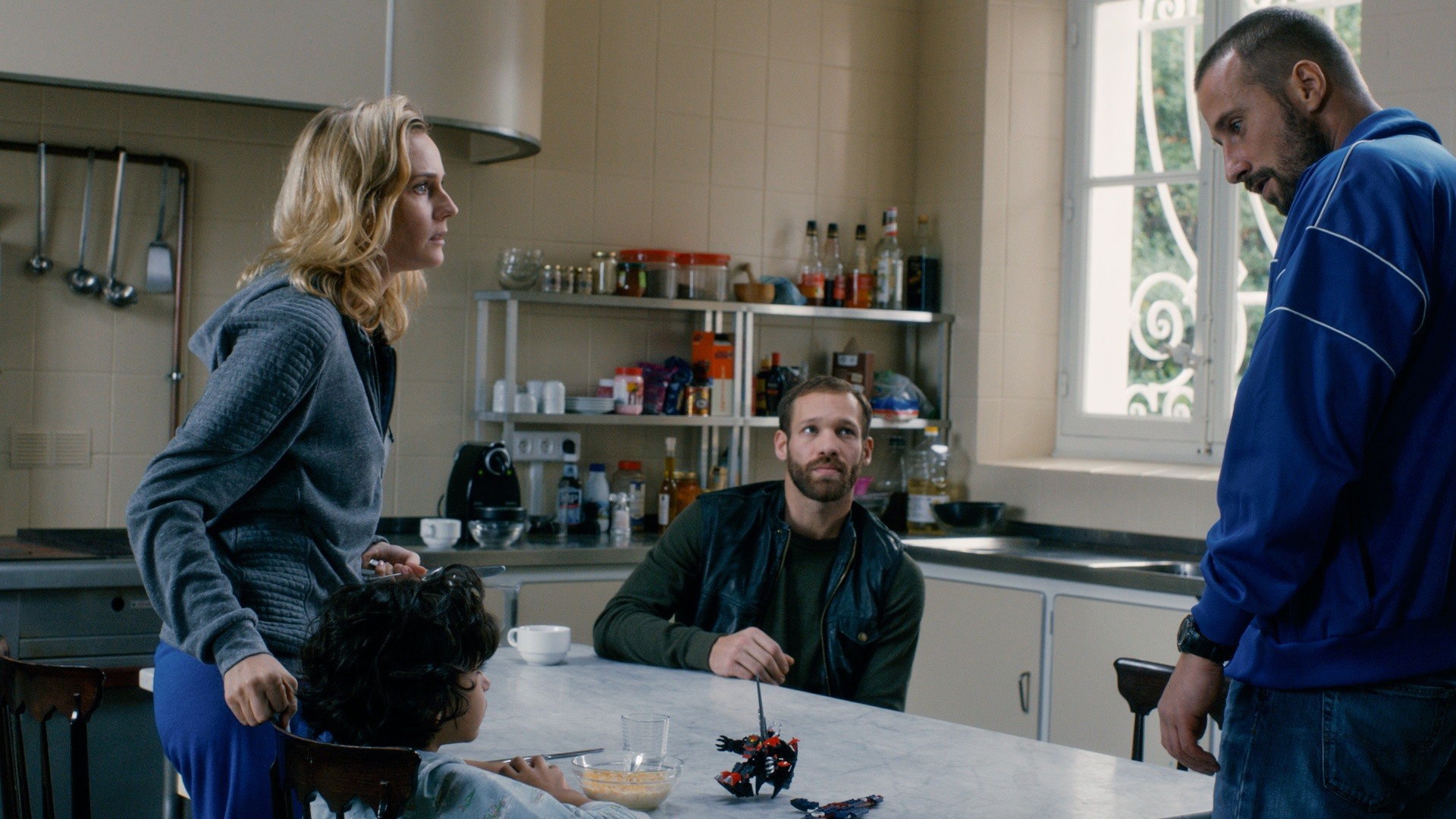Kieran, here reporting from AFI Fest in Hollywood.
 There's a moment of in Alice Winocour's Disorder (French title Maryland) where Jessie (played by Diane Kruger) tentatively and almost wordlessly embraces Vincent (Matthias Schoenaerts) from behind. It's a brief, but completely earned emotional beat, perfectly emblematic of the film's power. The film is billed as a "home invasion thriller," a description that betrays Disorder's rich textures and laser-like focus on character.
There's a moment of in Alice Winocour's Disorder (French title Maryland) where Jessie (played by Diane Kruger) tentatively and almost wordlessly embraces Vincent (Matthias Schoenaerts) from behind. It's a brief, but completely earned emotional beat, perfectly emblematic of the film's power. The film is billed as a "home invasion thriller," a description that betrays Disorder's rich textures and laser-like focus on character.
Vincent is a former soldier turned security guard working at a villa in France, inhabited by Imad, a wealthy businessman (Percy Kemp), his wife, Jessie and their young son, Ali (Zaïd Errougui-Demonsant). Vincent is suffering from PTSD and auditory problems, a result of his time in combat, which leads to bouts of paranoia. After some kind of international business deal goes awry while Imad is out of the country, Jessie and Ali become the target of hitmen, with Vincent left to protect them. This plot description could have easily led to something in the vein of Taken. What we get here is something far more interesting and cinematically daring.
Matthias Schoenaerts is, in many ways, the perfect actor to put at the center of this story. More...
His face is utterly captivating, particularly how it slides between incredibly emotive or completely impenetrable depending on what the scene calls for. He is helped in every way by Diane Kruger, who has less to do, but matches his intensity perfectly in the key moments. Winocour seems acutely aware of their powerful chemistry. Neither actor pushes it too hard. Any romantic chemistry between Vincent and Jessie is mostly audience projection, partly because the actors are other-worldly beautiful and audiences have been trained to expect an outwardly romantic subplot. Even the moments where Vincent interacts with Ali, Jessie’s son are refreshingly unsentimental. It would have been so easy to have Vincent and Ali bonding in a way that feels cloyingly precious, but the dynamic between them is more interesting and realistic than that. It’s not that Vincent is mean to Ali, exactly. We’re simply seeing how a man in his situation would likely behave around a young child and he does allow his temper to get the better of him on more than one occasion.
Disorder makes a key decision early on not to get mired in its high-concept logline. Whatever Imad has done in his professional life (or what his professional life even is, for that matter) to make his wife and son the targets of hitmen is secondary. Winocour instead spends the time laying the groundwork, making sure we understand the geography and the emotions of this world. A large portion of the film’s first act is a lavish party at the villa, populated with diplomats and other ambiguously important muckety-mucks. We see this party largely through Vincent’s point-of-view and we feel his unease and mounting dread. Not since Lars Von Trier’s Melancholia has a party scene felt so ominous and claustrophobic. It’s a note perfect entry point into the atmosphere of this thriller. This is thanks largely to the production design and the sound. That villa feels like it’s made up of nothing but dark corners. The sound design brings you into Vincent's headspace, allowing the audience to experience his auditory disorder and paranoia along with him. French techno artist Gesaffelstein's minimalist but moody score is also employed very smartly, never impressing itself too forcefully on the narrative.

The film’s handling of violence once the home invasion happens is (as gross as it sounds to say) perfect. This is because there are no embellishments, such as editing tricks or cinematography flourishes employed to enhance the violence or make it feel like the reason for telling this story. Even scenes of brutal violence are frank and realistically telegraphed. The brutality of the home invasion is clearly not where the film’s interest lies. Given the result, that’s surely something to be thankful for.
Grade: A-
